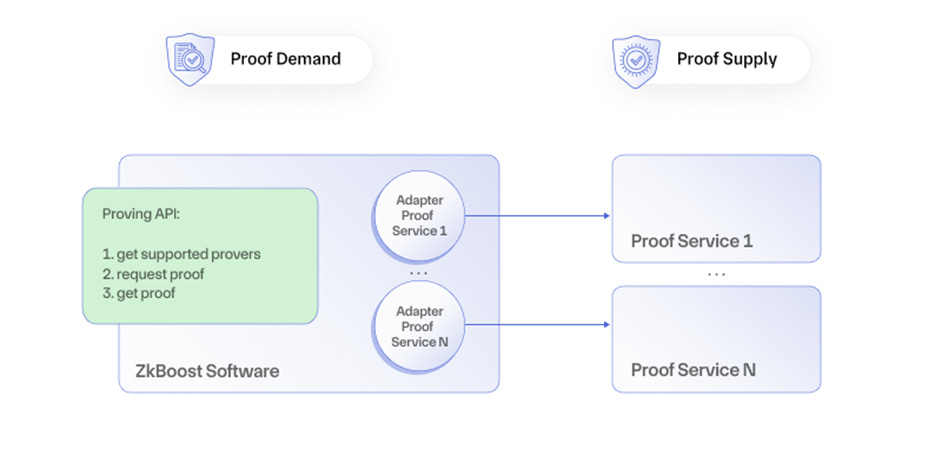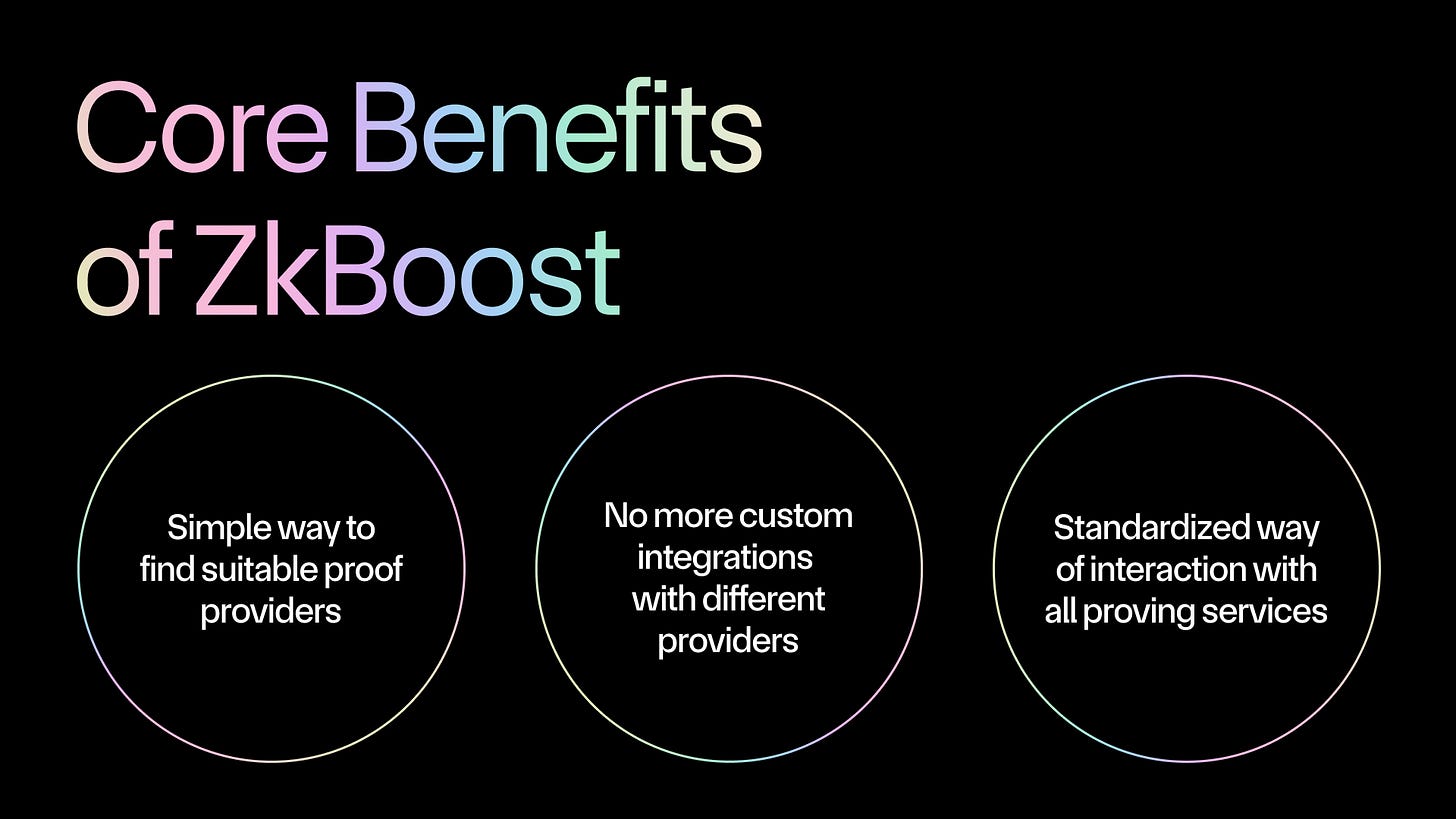ZkBoost: What It IS and What It IS NOT?
Interested in earning rewards by running nodes? You can sign up to Rent a Node to begin today. If you’re a project interested in renting ZK compute, start now with credits.
Introduction
ZkBoost is a unified client for outsourced zero-knowledge (ZK) proof generation, designed to reduce fragmentation and improve the user experience for proof outsourcing. However, recent discussions have highlighted that it is not fully clear to all parties what ZkBoost is and what it is not. In this write-up, we will clarify its purpose and scope, as well as its benefits and limitations.
What do ZK projects need?
ZK projects primarily need:
A competitive proving landscape with multiple third-party proof providers that compete in proving cost and performance.
An easy and seamless way to interact with all proving services through a single channel.
ZK projects additionally also need (among others):
Execution guarantees which could come in various forms, such as economic security, reputation systems, or SLAs.
A simple way to pay for proofs.
ZkBoost, as a unified user interface, focuses on the primary needs of ZK projects, while leaving room for third parties to develop additional features that benefit users of ZkBoost.
Solving the problem of fragmentation
Several prover networks, proof marketplaces, or centralized proof providers have emerged in the past 12 months, therefore the competitive proving landscape is a given. Competition is beneficial for proof requesters, but it results in fragmentation creating complexities.
What is the current user experience of L2s and any ZK project regarding outsourcing proof generation? Is there a simple way for projects to connect to all proof providers, without working with them individually?
Without a unified interface, proof requesters, such as L2s, need to rely on custom, provider-specific integrations, making it difficult to switch providers or use multiple proving services concurrently.
This is what ZkBoost aims to solve. ZkBoost reduces the fragmentation that proof requesters face in the proving infrastructure landscape while maintaining all the benefits of competition.
Let’s dive into what ZkBoost is and what it is not.
What ZkBoost IS NOT
1. Not a centralized service
ZkBoost is not a centralized service hosted by a single entity. Instead, it's software that runs in your own infrastructure. There is no central ZkBoost operator.
2. Not a proof market or quoting system
ZkBoost does not handle quotes from proof services or select the most performant or cheapest service for a proving task. The responsibility for choosing which provider to use remains with the proof requester.
3. Not a payment system
ZkBoost does not handle payments between proof requesters and proof services. Instead, users interact directly with proof providers and configure their payment methods accordingly.
4. Not a monitoring or SLA system
ZkBoost itself doesn't implement SLAs or service quality monitoring. While the software is expected to provide metrics, monitoring and establishing service level objectives are responsibilities of the proof requesters hosting ZkBoost.
5. Not a protection system against spam or malicious adapters
ZkBoost is not designed to handle spam protection for proof services. Authentication and request validation are adapter and proof service-specific concerns that are to be handled by the proof providers.
While ZkBoost provides an open adapter model, security concerns for malicious adapters are left to users and proof providers to manage.
6. Not a workflow orchestrator
Some proof systems require complex orchestration and proving processes, where the output of a subtask is the input to another task. ZkBoost follows a 1-in-1-out model, meaning that proof requesters submit one task and receive the final proof at the end. It is the proof providers who are responsible for orchestrating these multi-step processes internally.
What ZkBoost IS
1. An open-source proving client run locally
ZkBoost is not a centralized service. All proof requesters run ZkBoost locally on their own infrastructure. It is run by ZK projects as a local gateway, ensuring that they have direct control over their proof generation pipeline.
2. A unified interface for outsourced proving
ZkBoost is a user-centric client software for any ZK project. As a unified interface for outsourced proving it can break down the technical complexity by allowing proof requester to interact with every proving service in a standardized way.
No more custom integrations: By unifying access to proof providers through a standardized API, ZkBoost allows proof requesters to avoid custom integrations and easily switch between providers or work with many of them in parallel.
3. A translator for request submission
Proof providers have specific requirements for how proof requesters can submit proving jobs to them. ZkBoost removes this complexity, and provides proof requesters with a standardized way for proof submission, acting as a translator between service interfaces.
4. A single gateway to all proving services
The proving API allows proof requesters to connect to all proving services uniformly.
Proving API with the following functions:
Retrieve the list of providers supporting a specific prover, e.g. a zkVM or zkEVM,
Request proofs,
Fetch proofs.
Adapters: Proving services connect to ZkBoost through their adapters. These adapters are developed and maintained by the respective service providers.
Proof providers build and maintain their integrations with different proof systems, zkVMs or zkEVMs, and the adapters connect to the provider-specific integration.
5. A software that can be extended by third parties
ZkBoost’s architecture allows third-party organizations to build additional features, such as payments, or a monitoring system with service-level agreements (SLAs). This modular approach means that while ZkBoost itself does not handle payments or SLAs, specialized third-party services can add these functionalities.
By creating a unified user interface to all proving services, ZkBoost streamlines the process of finding the optimal third-party proof provider.
Core benefits of ZkBoost
As mentioned, ZkBoost is a user-centric proving client that brings a unified experience for proof requesters.
A simple way to find suitable proof providers: proof requesters can easily retrieve the list of proving services that support a specific prover program (e.g. a zkVM).
No more custom integrations with different providers: Proof requesters no longer need to rely on custom, provider-specific integrations, making it very simple to switch providers or use multiple proving services concurrently.
Standardized way of interaction with all proving services: proof requesters have a single interface to request and fetch proofs from any proof provider, or even multiple providers in parallel.
Conclusions and next steps
ZkBoost is an open-source client software designed to greatly simplify proof outsourcing for any ZK project. It provides the foundation for a more open and competitive ZK ecosystem, with opportunities for third-party enhancements.
By clarifying what ZkBoost is and what it is not, we hope to align expectations and encourage further collaboration in the ZK space.
As a next step, we are moving ahead with a more detailed technical design, and a v1 prototype of ZkBoost that can be demoed and be the basis for the next round of discussions on the path to designing an open-source software that benefits all stakeholders.
___
About ZkBoost Consortium:
The purpose of the ZkBoost Consortium Governing Council is to collaboratively develop standards for proof supply chain abstraction. We invite all ZK- or validity rollups and proving services to unite in architecting and funding ZkBoost, a generic abstraction for outsourced proving.
ZkCloud is funding early work on ZkBoost, but through establishing the Governing Council our goal is for ZkBoost to be a public good, open-source software.
About ZkCloud:
ZkCloud, built by Gevulot, is the first universal proving infrastructure for ZK. Generate ZK proofs for any proof system at a fraction of the cost. Fast, cheap, and decentralized.
Learn more about ZkCloud:
Website | Docs | GitHub | Blog | X (Twitter) | Galxe Campaign | Telegram | Discord



